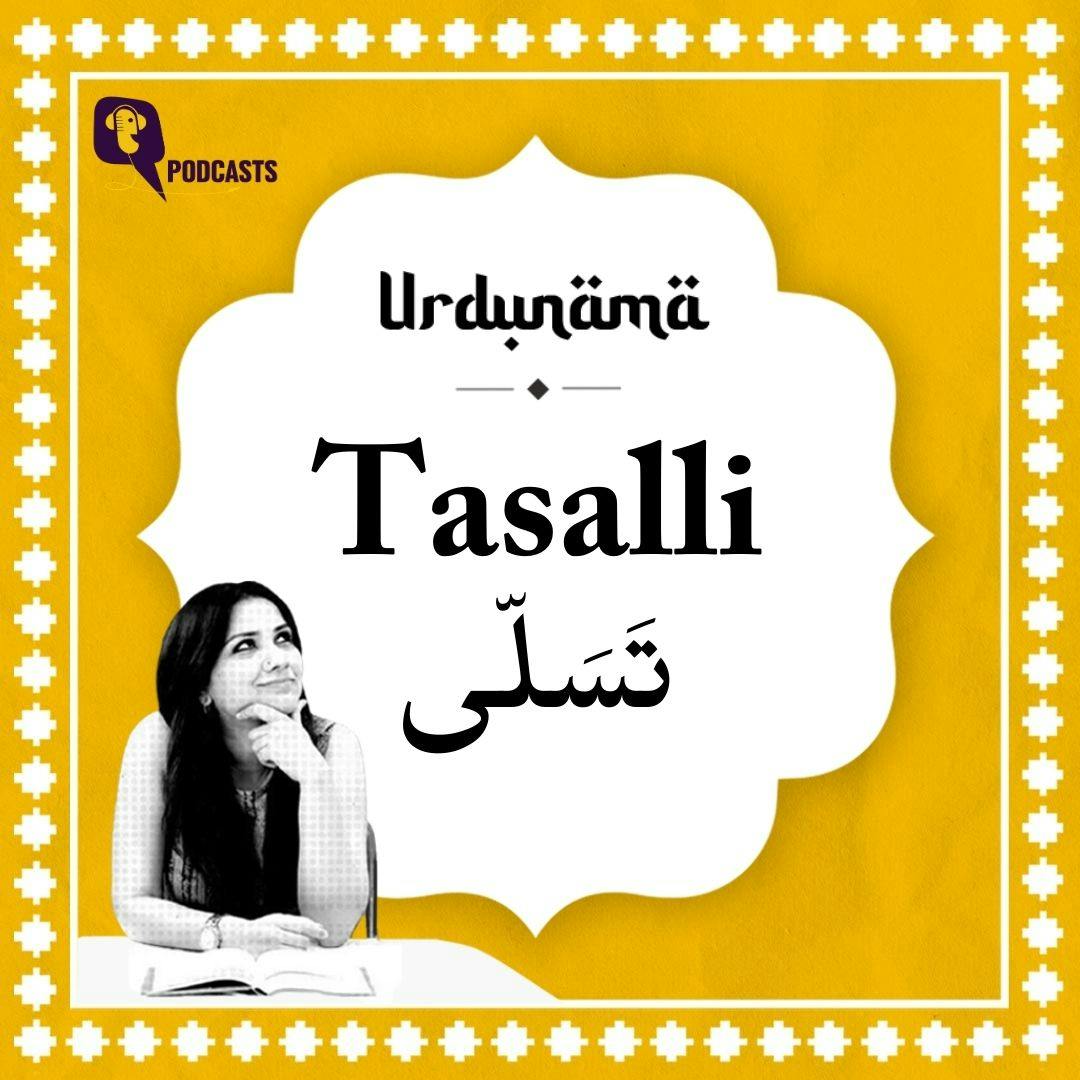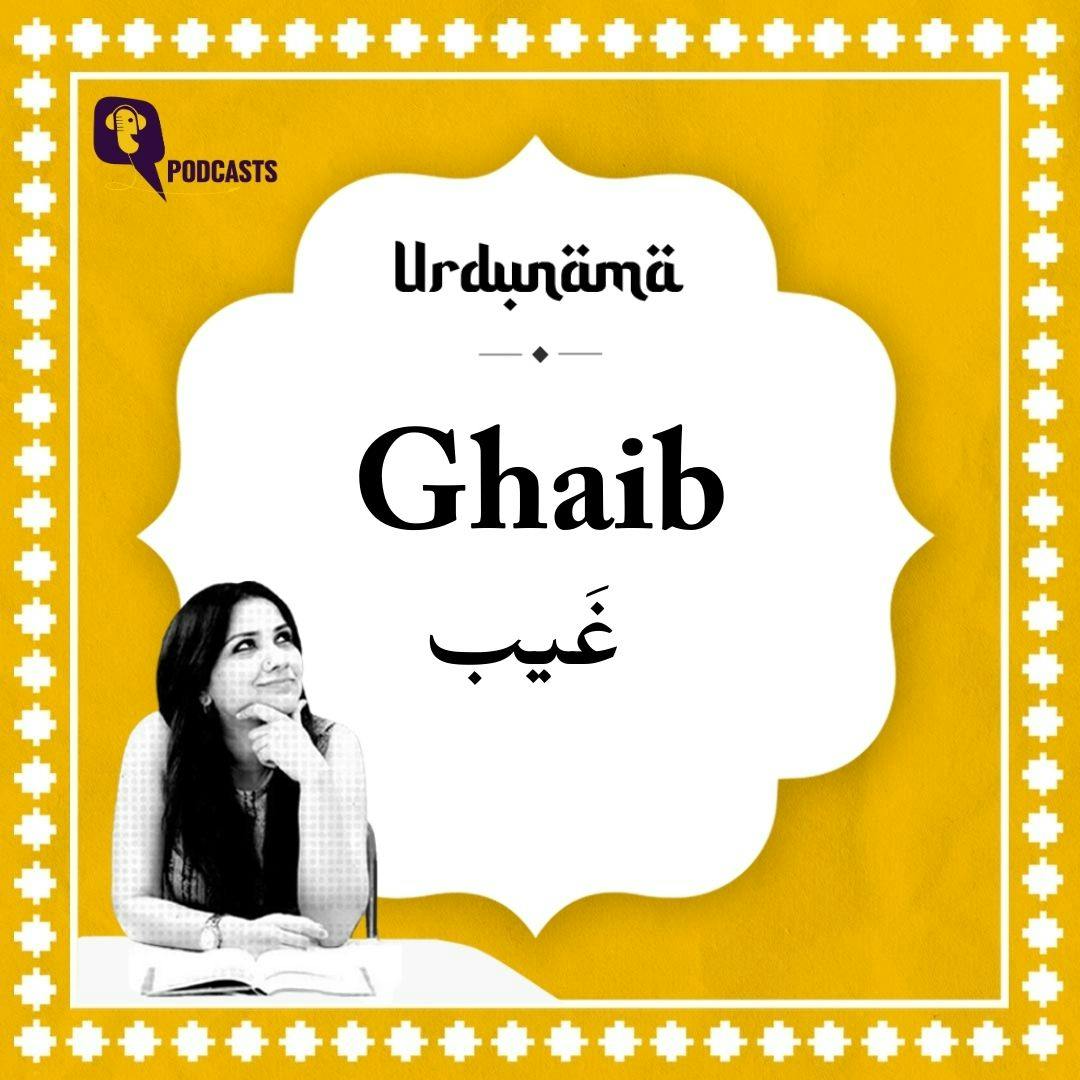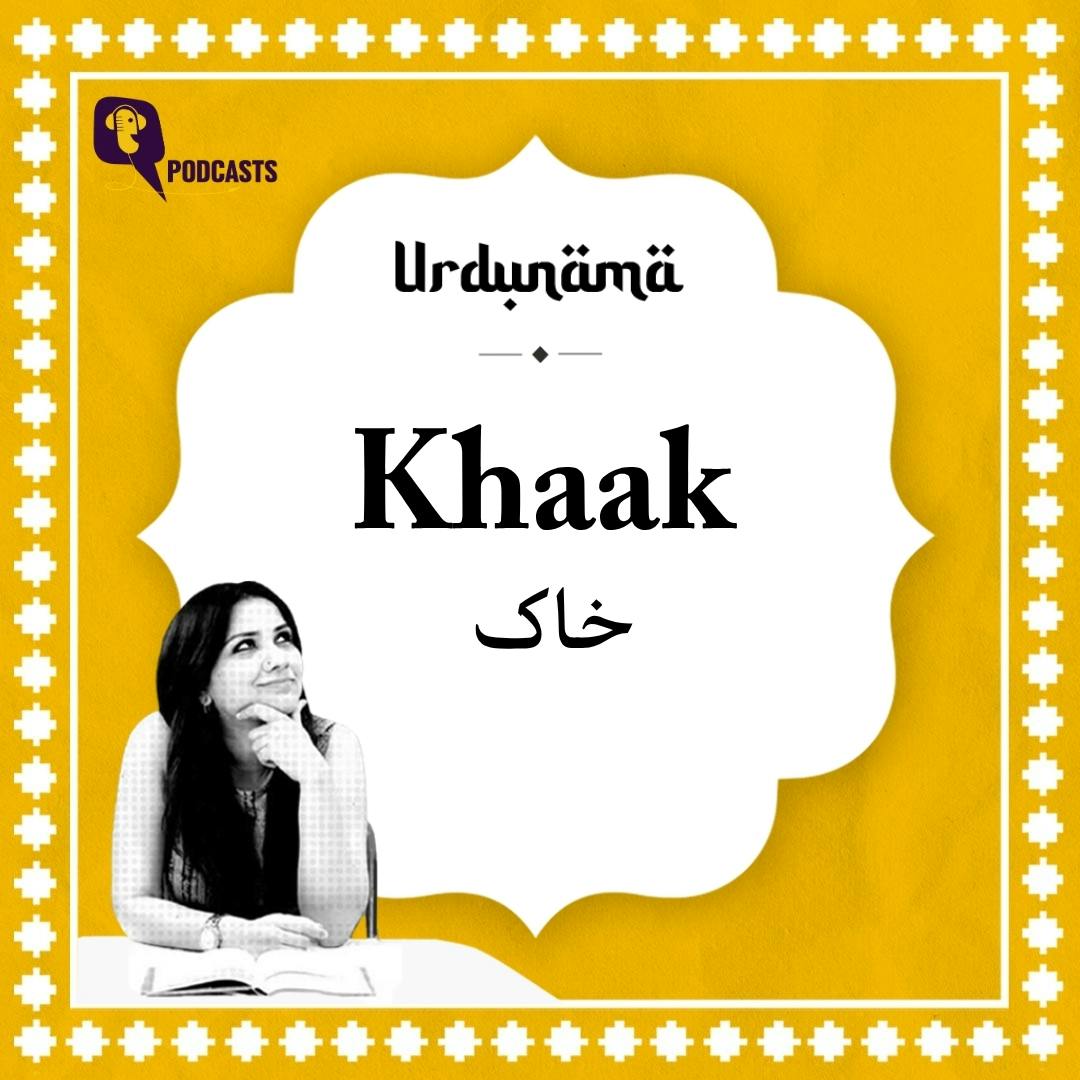Discover Urdunama
Urdunama

Urdunama
Author: The Quint
Subscribed: 4,118Played: 38,552Subscribe
Share
© 2024 The Quint
Description
Bollywood songs turn us all into Grammy award-winning bathroom singers! But wait, do you know the meaning of every word you sing? Especially the ones in Urdu? On Urdunama, our host Fabeha Syed takes one word at a time and breaks it down for you.
Be it the protest poetry of Faiz, or Sameer's 90s nostalgia, we have it all. If you like Urdu and poetry, this podcast is for you!
Be it the protest poetry of Faiz, or Sameer's 90s nostalgia, we have it all. If you like Urdu and poetry, this podcast is for you!
248 Episodes
Reverse
This week in UIrdunama, we explore poems that live inside our zehn, meaning our mind. But this internal world of the zehn keeps colliding with the one that belongs to the heart and its jazbātiyat (emotion driven clarity) that won’t be silenced. From Barelvi’s guiding light in confusion, to Jazib’s heart triumphing over intellect, to Javed Akhtar’s inner world in flames where only one surviving corner remains, these ashaar show how thoughts and feelings collide, break, and endure in every human experience. Tune in.
Learn more about your ad choices. Visit megaphone.fm/adchoices
In this week's Urdunama, we speak about 'Soch', meaning a personal lens through which we look at everything.With the intensity of Mohsin Naqvi, the softness of Bashir Badr, the sharp pain of heartbreak from rejectioon in Parveen Shakir's ghazal, and the mature understanding of boundaries in intimacy in Ahmad Faraz's nazm 'bhali si ek shakl thi', Fabeha Syed unpacks how thoughts shape love, loss, and the stories we tell ourselves.Because real life isn’t just about what happens to us, it’s about hum kis soch mein mubtala hain? (what kind of thinking are we caught up in?) tune in.
Learn more about your ad choices. Visit megaphone.fm/adchoices
In this week’s Urdunama, we remember Dharmendra not only as Bollywood's "Greek-God" hero but essentially as a man defined by two qualities - Pur-kashish (full of charm) and Shaista-mizaaj (gentle in nature). From humble beginnings in Punjab to a stunning, record 300 plus film-career, he was a man in love with Urdu zabaan.
Join us for a brief tribute to a star whose charm and grace remain unforgettable.
Learn more about your ad choices. Visit megaphone.fm/adchoices
Tasalli is a feeling of comfort, reassurance, and emotional support. It is what helps the heart feel calm when someone listens without judgment, shares your pain or simply lets you be with your emotions. Urdu poets like Aarzoo Lakhnavi write about tasalli as the space to process grief, letting tears flow and giving the heart time to settle. or, rather the lack of it when the poet is also expecting more than just words to pacify him. Jan Nisar Akhtar shows how tasalli can come from presence and intimacy, like a hand on the heart or words that make someone feel truly seen. Hasrat Mohani writes about its fragile and cyclical nature, how peace can come and go and memories can trigger those familiar unsettling old feelings. And in the episode you will also find yourself in the embrace of Faiz’s reminder that you are your own biggest and most effective healer in his iconic nazm, Mere Humdum Mere Dost. So tune in. It’s time to heal.
Learn more about your ad choices. Visit megaphone.fm/adchoices
In poetry, “Sannata” isn’t just silence but the stillness where everything stops. It is the absence of sound, of presence, of movement, yet it carries a strange weight. Poets like Gulzar, Ameer Qazalbash, Abbas Tabish and Manmohan Shukla ‘Talkh’ have turned this silence into a living emotion. For Gulzar, sannata comes sneakily, filled with the fear of losing someone. Ameer Qazalbash writes of a silence that feels like the aftermath of a tragedy. Abbas Tabish’s interpretation of sannata shows emotional distance between two people, And in Talkh’s verse, sannata becomes deeply personal, its the kind that takes away the sense of self.Tune in to explore how sannata speaks louder than words.
Learn more about your ad choices. Visit megaphone.fm/adchoices
In Urdu, chain means comfort, meaning when the heart finally feels at ease. Bechaini is the opposite. It is the restlessness that keeps you awake, searching for something more, something else.Poets like Faiz Ahmad Faiz, Shaikh Ibrahim Zauq, and Josh Malihabadi wrote from this space between calm and chaos. Maybe that’s what it is. Not choosing between comfort and restlessness, but learning to live with both and to let chain and bechaini speak to each other inside of us. Tune in as Fabeha Syed reads works of these masters among others.
Learn more about your ad choices. Visit megaphone.fm/adchoices
Roshni, meaning 'light', in Urdu poetry is never alone. It gains meaning only when contrasted with darkness, whether that’s doubt, loneliness, or the moments that challenge our hearts. Poets show us that hope isn’t about perfection; it’s about courage, resilience, and the quiet moments when even a small glimmer can guide us.From Shakeel Badayuni’s faith tested by doubt, to Bashir Badr’s morning breeze reminding us of small joys, and Waseem Barelvi’s light that moves and spreads wherever it can — roshni is alive and shared. In Urdu poetry, roshni is more than illumination. It is hope, presence, and the courage to shine even through the shadows of lurking tareeki meaning darkness. This Diwali, may we all try to stop looking for light outside, and become roshni ourselves. Tune in.
Learn more about your ad choices. Visit megaphone.fm/adchoices
In this episode, we explore Urdu word Ranj, sorrow, grief, and the small heartbreaks that shape our lives. From Sahir to Dagh, Shakeel, and Irfan, each poet has experienced, expressed, and understood Ranj in their own way. Sometimes it becomes empathy, sometimes resilience, and sometimes a quiet irony.We unpack these layers through poetry and reflection, showing how Ranj is not just about pain but also about how we feel, endure, and even find meaning in it. Tune in.
Learn more about your ad choices. Visit megaphone.fm/adchoices
In this episode, we explore the word Hazir — a simple word that means “present,” but in Urdu poetry it holds much deeper weight. With verses from Parveen Shakir and Ahmad Faraz, we look at how hazir shifts in its context and scope. the couplets curated in this episode reminds us that being hazir is never just about attendance. It’s about presence with all its complexity — love, loss, surrender, resistance — and it asks us what it really means to show up fully in front of another person, or in front of the truth. Tune in.
Learn more about your ad choices. Visit megaphone.fm/adchoices
In this episode, we dive into the idea of ghaib — that mysterious, hidden side of life that we can’t fully see or grasp. We move from the mystical inspiration in Ghalib’s poetry, to the revolutionary energy in Chakbast’s ghazal, and the creative intinacy that echoes in Ahmad Salman’s verses, discovering how poets have drawn from the unseen to fuel creativity, emotion, and reflection.But ghaib isn’t just a poetic idea. In real life, it’s a gentle reminder that we don’t have control over everything. We can’t always know what others are thinking, what the right outcome of our choices will be, or why certain things happen. And that’s okay. Understanding this allows us to focus on what we can control, while letting go of what we can’t.Through poetry, reflection, and real-life lessons, this episode shows how embracing the hidden can bring clarity, patience, and a deeper sense of peace.
Learn more about your ad choices. Visit megaphone.fm/adchoices
What does it mean to 'dance' in Urdu poetry?
In this episode of Urdunama, Fabeha Syed explores Raqs, the movements, the madness, and the magic behind it. It's the kind that moves your heart, your soul, even the world around you.
We look at the ashaar of Majrooh Sultanpuri, Saghar Khayyami, and Abbas Tabish, and see how they turn dance into metaphor: the joy of little steps, the madness that takes over, the wild energy that can’t be contained. From playful, innocent moments to powerful, overwhelming ones, raqs shows us how poetry captures life in motion.
Tune in, and feel the rhythm of 'Raqs' through Urdu poetry.
Learn more about your ad choices. Visit megaphone.fm/adchoices
In this episode of Urdunama, Fabeha Syed explores the word Fursat, those rare moments of time when you can pause, breathe, and just be. What does it mean in Urdu poetry? We look at the ashaar of Ghalib, Faiz, and Sahir, tracing how each poet reflects on these small luxuries: the freedom to imagine, the quiet spaces that let life breathe, and the way even fleeting moments can feel enormous. From daydreaming about the beloved to feeling the weight of solitude and the world’s relentless pace, fursat becomes more than just leisure, it’s a window into the soul. Tune in.
Learn more about your ad choices. Visit megaphone.fm/adchoices
This week on Urdunama, we talk about manzar, a word that means a view, a scene, a spectacle. In Urdu poetry, though, it’s more than just scenery; it’s like a theatre of the mind where words create pictures and feelings at the same time. With the verses of Gulzar, Nida Fazli, and Bashir Badr, we look at how one simple manzar can open up entire worlds of silence, dreams, and reflection.
Learn more about your ad choices. Visit megaphone.fm/adchoices
For centuries, Urdu has been part of a shared cultural space, shaped by people from diverse communities and traditions. Yet this fact is often forgotten or pushed aside. That’s why the new anthology Whose Urdu Is It Anyway? feels so important.
Edited and translated into English by writer, literary historian, and translator Dr. Rakhshanda Jalil, the book brings together 16 Urdu short stories written by non-Muslim writers. The collection features powerful voices such as Krishan Chander, Rajinder Singh Bedi, Kanhaiya Lal Kapoor, and Gulzar, among others. Together, their stories challenge the stereotype that Urdu belongs to a single identity, reminding us instead that it has always been a language of many, reflecting universal themes of love, loss, displacement, and belonging.
Learn more about your ad choices. Visit megaphone.fm/adchoices
Shiddat means intensity, the force of feeling when emotion refuses to stay small. It is love that burns without pause, grief that floods without mercy, joy that shakes the soul to its core. Shiddat is the storm within us, the fire in every longing, the ache in every absence. It does not whisper; it roars. In Urdu poetry, shiddat is the heartbeat of passion and pain alike, where words become flames, and silence carries weight.
In this episode of Urdunama, we step into the world of shiddat through the verses of poets who captured the fiercest shades of the human heart.
Learn more about your ad choices. Visit megaphone.fm/adchoices
Khaak means dust, humble, weightless, and ever-returning to the earth. It is where all journeys end and where every beginning quietly stirs. Khaak carries the memory of everything it has touched, walls once standing, feet once wandering, lives once lived. In Urdu poetry, khaak becomes a reminder of impermanence, of the fragility of glory, and of the beauty in humility. It speaks of both finality and renewal, of endings that feed beginnings.
In this episode of Urdunama, we walk with khaak through the verses of poets who have found in it life’s deepest truths.
Learn more about your ad choices. Visit megaphone.fm/adchoices
Zakhm means wound, but in poetry, it is more than just pain. It is memory stitched into skin, heartbreak carried in silence, and love that once cut deep. A zakhm can be raw or hidden, healing or haunting. In Urdu verse, it becomes a canvas, where sorrow turns into metaphor, and suffering into something almost beautiful. Zakhm isn’t just what breaks us; it’s what shapes us.
In this episode of Urdunama, we explore the many meanings of zakhm through the verses of poets who transformed pain into poetry. Join us as we reflect on how wounds, seen and unseen, leave marks that often speak louder than words.
Learn more about your ad choices. Visit megaphone.fm/adchoices
Hassaas means sensitive, a word that lives in the pauses, in the glances that linger a little longer, in the hearts that feel too much, too deeply. To be hassaas is to notice what others miss, to carry invisible weight, to be moved by the slightest shift in the air. It is a gift of awareness, but also a quiet ache—a constant hum beneath the noise of the world. In Urdu poetry, hassaas becomes the soul of expression, where pain, love, and truth are felt in their purest forms.
In this episode of Urdunama, we explore the delicate world of hassaas through verses that honour vulnerability, emotional intensity, and the quiet power of those who feel deeply. Join us as we reflect on sensitivity, not as fragility, but as a different kind of strength.
Learn more about your ad choices. Visit megaphone.fm/adchoices
Beyhis means numb—an absence of feeling that grows not from peace, but from exhaustion. It is the quiet void after too much pain, the stillness that follows when even sorrow becomes heavy to carry. Beyhis is not indifference; it is the body and soul’s final defense, a silence that shields, a pause that protects. In Urdu poetry, it becomes a haunting space—where once there was fire, now only cold remains.
In this episode of Urdunama, we explore the layered meaning of beyhis through verses that reflect emotional withdrawal, inner fatigue, and the ache of feeling too much, for too long. Join us as we uncover the poetry in numbness—and the quiet truths it tries to hide.
Learn more about your ad choices. Visit megaphone.fm/adchoices
Malaal means regret, a soft ache that lives in silence, in the pause between what was and what could’ve been. It is not always loud or visible, but it lingers in missed chances, in unsent letters, in goodbyes that never found their words. Malaal doesn’t ask to be resolved; it asks to be remembered. In Urdu poetry, it becomes the quiet thread that ties together loss, longing, and lessons not yet learned.
In this episode of Urdunama, we sit with malaal, not to escape it, but to understand it. Through verses soaked in memory and emotion, we explore how poets have turned regret into reflection and sorrow into something beautifully human.
Learn more about your ad choices. Visit megaphone.fm/adchoices

























بہت اعلیٰ! آپ نے بہت خوبصورت تشریح کی ہے ۔
love from Pakistan. madam judayi pa bana lo.
Need a better singer, haha
Amazing podcast!
Amazing podcast 👍
Lovely background music at the start. Source?
Love your voice.. ❤️
loving this podcast. remembering the old late night radio talks. keep up the good work
Y'all be speaking in English when the title says Urdu. I'm here to learn the language by listening and so on tho the host speaks somewhat Urdu (sometimes she too switches to English suddenly and you be like wth!?) but most other people sticks to English for whatever reason smh!
You have a great voice, diction and command over the language. Bless your heart.
I really appreciate. I love urdu literature and enjoy listening to this professional podcast.
Lots of love from punjab. my favorite podcast. big respect 🌻🌻🌻
fabiha your podcast is good as always, please keep it as a source of light during these dark times!
Buhat khub..
koi na koi khushi muqtasar hi sahi,, par hoti zaroor hai. I kno its not a part of a couplet,, but i like this line 👌👌
yaad e maazi azaab hai ya rab,, cheen le mujhse Haafiza mera waah,
my favourite episode, so beautifully explained and expressed. definitely going to use some words to express to my loved ones
What a beautiful podcast !! Wish it was much much longer
What an absolute gem this podcast is. I'm so glad you are making this, and that I discovered it :)
hi fabeha, i would like to tell that you got such a beautiful voice. its so soothing so melodious... cannot appreciate more. i will maybe find some sher or shayari on your voice which can express the feeling more accurately. also, can you please make a podcast on "whats the difference between sher and shayari?" or maybe just comment here thank you. may your voice survive for ages.